Mykola Babak
| Mykola Babak | |
|---|---|
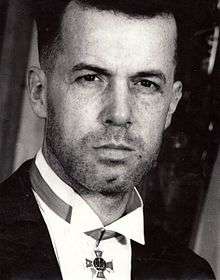 | |
| Born |
Mykola Babak 10 June 1954 Cherkasy Oblast (Ukraine) |
| Nationality | Ukrainian |
| Known for | painting |
| Movement | transavantgarde, hyperreality, neo-expressionism, assemblage |
| Awards |
Shevchenko National Prize |
| Website | |
Mykola Babak (Ukrainian: Микола Бабак, 10 June 1954) is a Ukrainian artist,[1] writer, publisher, and art collector from Cherkasy Oblast.
Biography
Mykola Babak was born in Voronyntsi, Cherkasy Oblast. In 1971 he finished Melnyky Secondary School. From 1972 till 1972 he served in the Soviet Army. After demobilization he worked as a designer at Cherkasy "Azot" Company and at Cherkasy Combine of art-advertisement. From 1979 till 1985 together with group of Russian artists he managed monumental projects (paintings, mosaics, stained-glass windows) in the far-east of Russia. In 1986 Mykola Babak came back to Ukraine.
Babak is the member of National Union of Artists of Ukraine (from 1990), Merited Artist of Ukraine (2004), Shevchenko National Prize Laureate (2010). His works are at the National Art Museum of Ukraine, Ministry of Culture and Tourism of Ukraine, Ministry of Culture and Mass-Communication of Russian Federation. Babak lives and works in Cherkasy.
Art
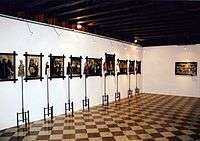
Babak's artistic works are made in the techniques of hyperreality, neo-expressionism, transavantgarde, assemblage.[2] The artist adheres to the stylistic principles of post-avantgarde. He is known for his national project "Your children, Ukraine" at the 51st Venice Biennale (2005).
Collecting
In 1990 Babak began to collect Ukrainian folk art. He has collections of folk icons from the 18th to 20th centuries,[3] folk naïve paintings, folk photos[4] and household items of the central upper Dnieper River region. The collection of folk icons is considered to be the most outstanding while it represents the iconography of Taras Shevchenko's land where the basis of the Ukrainian nation, language and culture was formed.
Gallery
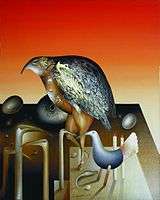
The Day of Unborn Birds.
Oil on canvas, 1998.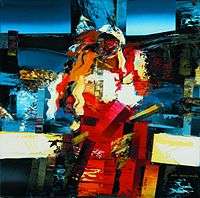
Two souls.
Oil on canvas, 1989.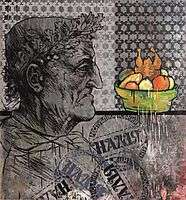
Temptation.
Oil on canvas, 1992.
Return from a Chase.
Oil on canvas, 1992.
Seal of Twilight.
Oil on canvas, 1994.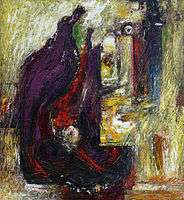
African Motive.
Oil on canvas, 2000.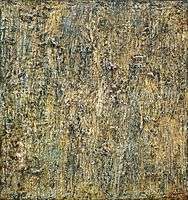
Epitaph of Stubble.
Oil on canvas, 1998.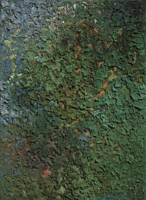
Foredawning Sublimation.
Oil on canvas, 1996.
References
External links
- ВВС about Mykola Babak's project "Your children, Ukraine" at Venice Biennale
- Mykola Babak's Exhibition
- Folk icons from Mykola Babak’s collection
- 500 FOLK ICONS FROM A PRIVATE COLLECTION
- 27.01.2006 – 19.02.2006. Mykola Babak. “Celestial Chronicle” . Photoinstalation